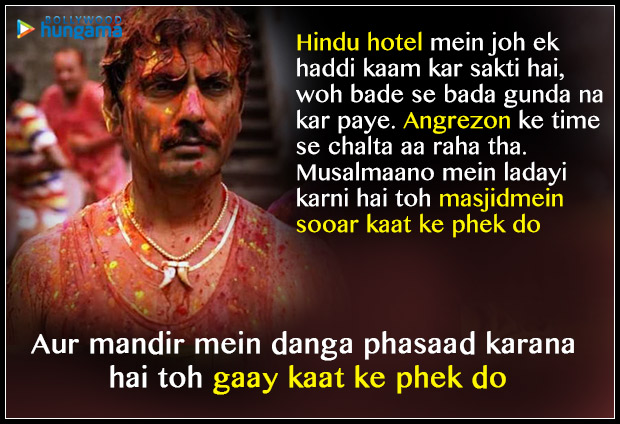
Things even end on a cliffhanger, promising answers sometime in the future, but neither the present plot nor the characters forced to wrestle within it traverse interesting waters in the meantime. Sartaj and his peers play what feels like an entirely different game involving people plucked from Gaitonde’s past who, in the present, may as well be different characters. His proximity to Mumbai’s real history makes him a cipher, though Sartaj’s decoding of his conspiracy in the present lacks any moral or religious grounding, at least until the season’s final moments. Gaitonde claims to be above religious conflict, though he can only go so long without being dragged into the communal violence he continually ignores. Gaitonde’s rise to power - intercut with real footage of religious riots and terrorist attacks - takes advantage of a world that grows increasingly frayed. But its 2018 equivalent recontextualizes the flashbacks in ways that robs them of their impact. The half of the show set in the ’80s and early ’90s is a twisted tale of bloodshed, unfolding as Gaitonde exacts control over Mumbai’s slums. In true Netflix fashion, they’re trapped on a story-treadmill, rarely shifting the thematic needle in any coherent direction. The characters in the present move, though only geographically and in service of the plot, between a cortège of garish neon locales.


The present however, directed by Vikramaditya Motwane (Udaan), involves local cop Sartaj and Intelligence officer Anjali Mathur (Radhika Apte) trying to solve Gaitonde’s riddles in ways that feel distant from his cult-like musings. Gaitonde’s past, directed entirely by Anurag Kashyap (Gangs of Wasseypur), is a tale of power. As if from beyond the grave, Gaitonde, a man who fancies himself a god, unravels the past - his own, and that of Mumbai - and creates dueling narratives that result in a fundamental disconnect. While the first chapter features flashbacks narrated to Sartaj by Gaitonde, the remaining seven feature a similar structure, sans narrative motivation. Gaitonde, who choses Sartaj specifically for of his moral fortitude, waits until the two lock eyes before shooting himself in the head, leaving Sartaj in the blind, though with a newfound sense of urgency. MAJOR SPOILERS FOR THE END OF EPISODE 1 AHEAD.
SACRED GAMES RATING SERIES
It’s impossible, however, to talk about the rest of the series without revealing how episode 1 ends. This cat-and-mouse game makes up the majority of the first episode, a thrilling introduction in which characters reflect (at times literally, through mirrors and water) on the building blocks of their very selves. Bit by bit, Gaitonde narrates his own story, a tale of violence and self-centered ideology in direct contrast to the morally pure Sartaj, who traces the call before coming face to face with Gaitonde himself. References to Sartaj’s late father, a former policeman, and vague threats about some humungous danger to Mumbai that will unfurl in twenty-five days send the good cop on a solo mission to catch the elusive don. Gaitonde, a self-professed deity, speaks to Sartaj in riddles. Before the kindly Sartaj can wrestle with the transgression asked of him, he receives a mysterious phone call from a legendary gangster long thought to have fled the country, Ganesh Gaitonde (Nawazuddin Siddiqui). A Sikh member of the Mumbai police force - perhaps a part that should’ve gone to a Sikh actor so few are given roles in the Indian mainstream - Sartaj is an outsider caught in a web of corruption, unwilling to compromise when his superior, DCP Parulkar (Neeraj Kabi), instructs him to change his statement on a fatal police shooting. In a world of relative morals, Sartaj Singh (Saif Ali Khan) is a good man in almost absolute terms. As a whole however, it’s a haphazard, hamstrung morality play that can’t seem to balance its moving parts. Its imagery is propulsive, when divorced from any larger context. Unshackled from the censorious constraints of Indian cinema, it’s an often ambiguous, unapologetically violent work set against Mumbai’s criminal underbelly. It bleeds street-level authenticity seldom seen in the Indian mainstream - characters speak Hindi, Marathi, English and Punjabi, though the series’ default audio setting internationally is its English dub - trading in the polished poetry of Bollywood dialogue for uncouth, often hilarious swearing. Bollywood mainstay Saif Ali Khan leads a who’s-who of tremendous talent in a show helmed by two of the industry’s most interesting directors, but its spectacle lies mostly in its lurid texture. Sacred Games, the first Indian Netflix series, ought to have been spectacular.


 0 kommentar(er)
0 kommentar(er)
